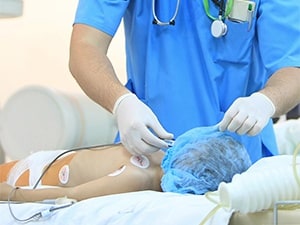Failure to Diagnose Supraventricular Tachycardia
 This failure to diagnose lawsuit was filed on behalf of an infant girl in Baltimore County. It was filed in Health Claims Arbitration on April 17, 2017, and is the 182nd medical malpractice case filed in Maryland in 2017.
This failure to diagnose lawsuit was filed on behalf of an infant girl in Baltimore County. It was filed in Health Claims Arbitration on April 17, 2017, and is the 182nd medical malpractice case filed in Maryland in 2017.
A newborn girl (19 days old) is brought to the ER at Franklin Square Hospital. She is pale, weak, and she has a decreased response to stimuli. Her heart rate is high and she is dusky. She is in clinical shock. He starts her on broad spectrum antibiotic coverage and IV fluids.
Defendant administers 340 cc of IV fluid. Plaintiff alleges this is a considerable amount of fluid to give to an infant, even to combat dehydration. However, the girl is not dehydrated - she is actually suffering fluid overload secondary to congestive heart failure caused by supraventricular tachycardia or SVT (abnormally fast heart rhythm). The girl goes into cardiac arrest, resulting in severe neurological consequences such as permanent brain injury and damage, seizures, and developmental delays.
Her parents file this claim and allege that if defendants had correctly diagnosed their daughter and treated her SVT in a timely manner, she would not have suffered cardiac arrest or the neurological damages caused.
Additional Comments- Plaintiff's expert contends that the combination of the excessive fluids she received combined with the delayed diagnosis that resulted in the child's cardiac arrest that caused her injuries.
- One option the doctors had that plaintiff's expert does not mention is a vagal maneuver. This is applying a bag of ice water or ice over the face including the mouth and the nose. The purpose is to stop the baby from breathing for a time to provoke a powerful vagal response. The vagal nerve goes to the heart and slows down conduction through the atrioventricular node which is part of the cycle that allows supraventricular tachycardia to occur. If conduction there is slowed, it can break the supraventricular tachycardia.
- Plaintiff's expert argues that the doctors should have given the child either Adenosine or considered a cardioversion. Adenosine is a fairly dangerous drug that can paradoxically cause cardiac arrest. Adenosine treats for supraventricular tachycardia by slowing down the electrical activity of the atrioventricular node. This is the electrical relay between the atrium chambers, the upper chambers of the heart, the ventricle chambers, and the lower chambers of the heart. In supraventricular tachycardia, the electrical impulse passes through the electrical conduction system at the top of the heart. Adenosine breaks the fast loop cycle of supraventricular tachycardia by blocking that impulse from passing. The hope is that this allows the heart's natural pacemaker to regain a sinus rhythm.
- Baltimore County
- A physician and emergency room pediatrician
- Franklin Square Hospital Center, Inc.
- Medstar Health, Inc.
- Franklin Square Hospital
- Failure to make diagnosis of SVT in a timely manner
- Failure to recognize how abnormal the patient's heart rates were
- Failing to correctly treat SVT
- Providing the patient with additional IV fluid, accelerating the patient's deterioration
- Medical Negligence
- Negligence/Medical Malpractice/Respondeat Superior/Agency
- Stephen Lieberman, M.D. - board certified in general pediatrics; licensed in Massachusetts
If you have suffered due to the negligence of a doctor's failure to diagnose your condition, we can help you. Miller & Zois has a history of results in medical malpractice cases, earning large verdicts and settlements. Call Miller & Zois at (800) 553-8082 or get an online case review.
More Malpractice Claim Information- Another infant death lawsuit, this one in Charles County in 2016
- Other cases filed against Franklin Square Hospital this year:
- An ER malpractice case after a woman suffers a heart attack while at the hospital
- A birth injury case filed in March
 Miller & Zois, Attorneys at Law Home
Miller & Zois, Attorneys at Law Home











